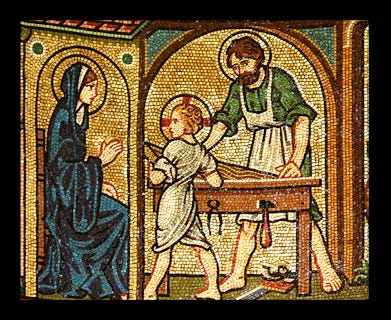Rejecting the Carpenter Christ (Mark 6:1-6)

In Mark 6, Jesus begins teaching at the synagogue in his hometown of Nazareth. Many people are “astonished” at his wisdom and the mighty works performed “by his hands” (6:2). Yet instead of being enamored with Jesus, the crowd is offended at him (6:3). The Greek word translated as “offended” is skandalizó, which means to “scandalize” or “cause to stumble.” The crowd doesn’t respond to Jesus in faith and devotion, they respond with suspicion. They seek to discredit him. Nazareth’s offense lies at the center of verses 1-6:
A. Jesus arrives to Nazareth; teaches in synagogue (vv. 1-2a)
…B. Many are astonished by Jesus (v. 2a)
……C. Mighty works are performed by hands (v. 2b)
………D. Carpenter; Mary, Brothers, Sisters (v. 3a)
…………E. “They were offended at him” (v. 3b)
………D’. Prophet; Country, Relatives, House (v. 4)
……C’. No mighty works, except a few by hands (v. 5)
…B’. Jesus marvels at Nazareth (v. 6a)
A’. Jesus goes to the villages, teaching in a circuit (v. 6b)
In their astonishment, the crowd asks, “Is this not the carpenter?” Here we have a vocation attributed to Jesus. This is the only story in the Bible that alludes to Jesus’ vocation, or him having one at all (cf. Mt. 13:55). Though Scripture never confirms this to be Jesus’ vocation, we have reason to believe the crowd. They aren’t wrong about Mary being his mother (Mt. 1:16) or of him having siblings (Mk. 3:32-35). They have an adequate knowledge of Jesus’ life, so much so that they presume to know the names of his brothers. It’s reasonable to conclude that the crowd would also know Jesus’ vocation.
The crowd mentions carpentry in verse 3 just after speaking of Jesus’ hands in verse 2. “Such mighty works are performed by his hands” is immediately followed by “Is this not the carpenter?” This presents an interesting connection in the text. Carpentry, of course, requires skilled hands. The carpenter uses his hands (both bare and with tools) to transform wood into new creations. So, too, Jesus does “mighty works” – miracles that transform – with his hands. Having a hand-working vocation would reinforce this reality, not take away from it.
Yet Jesus’ credentials do not fit Nazareth’s expectations of such a gifted teacher. They can’t reconcile Jesus’ vocation with his mighty works. But if Jesus is a carpenter, there’s no scandal in him performing mighty works “by his hands.” It’s his job. He’s been doing it his whole life. What the crowd sees as incompatible is in fact complementary. Nazareth thought they knew all about Jesus, but they did not know the extent of his skill.
Carpenters were hired in the Old Testament to build David’s house (2 Samuel 5:11) and to repair the house of Yahweh (2 Chronicles 24:12). Mark 6 presents Jesus as a master carpenter, arriving to repair the house of Yahweh in the synagogue. But his work is rejected.
In verse 5 we read that Jesus did no more “mighty work” in Nazareth, except that he “laid his hands” on a few sick people and healed them. Once again Jesus is working with his hands, but minimally so. This is Nazareth’s consequence for rejecting him. Nazareth’s house will not be fully restored to Yahweh. Jesus exiles himself from the city and we never see him return (6:6).
Jesus will later undergo another exile outside of another city (John 10:18; Hebrews 13:12-13). In that instance, his departure will not be permanent (Mark 16:6-7). The carpenter returns to finish the job.
The post Rejecting the Carpenter Christ (Mark 6:1-6) appeared first on Kuyperian Commentary.

